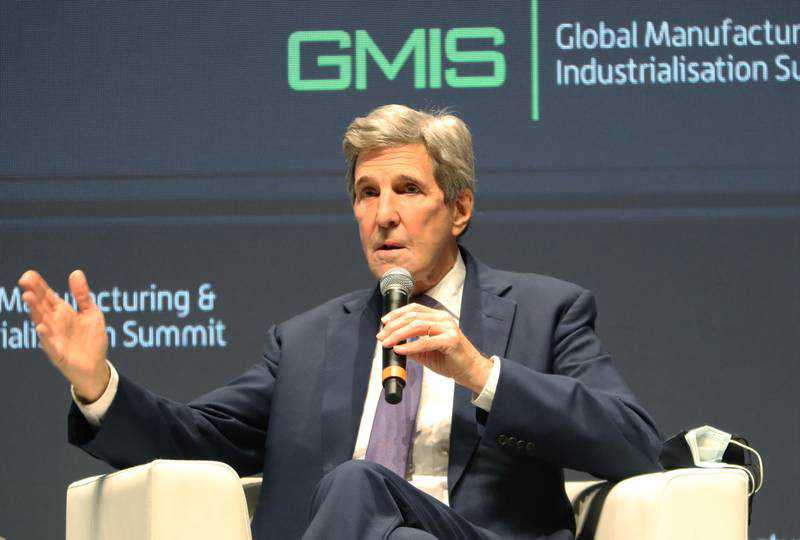GMIS 2021: Oil and gas sector stepping up to support climate change goals, says John Kerry
23 November, 2021

Oil-producing nations and companies have a key role in helping to eliminate harmful emissions, but the clock is ticking and not moving fast would result in the worst consequences of climate change, according to John Kerry, the US special envoy for climate.
Mr Kerry, a former secretary of state under the Obama administration, dismissed the notion that the oil and gas industry is at odds with proponents of climate change action, saying the lines of communication are always open for these industries, which have been co-operative and have joined the growing chorus of economy-defining sectors supporting the need to save the environment.
“The oil and gas industry has never had a hard time having its voice heard. Right now, we have tremendous co-operation with oil and gas companies, and they know there's a transition,” he said at the fourth Global Manufacturing and Industrialisation Summit in Dubai on Monday.
“The question is, will we transition fast enough to avoid the worst consequences of the climate crisis?”
The energy sector is one of the largest sources of methane emissions today, with the International Energy Agency estimating that fossil-fuel operations emitted around 120 metric tonnes of methane globally in 2020, equivalent to around 3.5 gigatonnes of carbon-dioxide equivalent.
Almost 45 per cent of current oil and gas methane emissions could be avoided at no net cost if well-known technologies and measures can be deployed, the IEA added. Countries can also implement a set of well-established policy tools so emissions from operations could be halved within a short time frame, it said.
With pressure mounting to adhere to climate change goals, companies are now compelled to spell out their sustainability plans in their balance sheets, something that has been done only recently, Mr Kerry said.
“You see disclosures in financials beginning to occur, companies required to report their long-term vision with respect to climate impact investments … that will change the allocation of capital,” he said.
The evolving business environment in relation to this would then see the overall marketplace – which, Mr Kerry said, is worth trillions – move into new technology as companies act to align themselves with these goals, at the same time trying to tap into new business opportunities.
“People are seeing economic opportunity, and the money is always going to chase economic opportunity. There's going to be profits; people are going to make lots of money as they move into this new economy,” he added.
The transition is already taking place, and Mr Kerry stressed the diverse nature of industries and companies that have committed to climate change goals. He said the airline industry pledged that 5 per cent of the fuel it will use will be 85 per cent free of emissions.
Maersk, the world's largest shipping operator, ordered eight carbon-neutral container ships, while Swedish car maker Volvo announced an agreement for the development, production and commercialisation of the world’s first vehicles made of fossil-free steel. Holcim, one of the largest manufacturers of building materials, is now making green concrete.
“If we achieve the goal that 109 countries signed up for in the Cop26 in Glasgow for methane, we would have the equivalent by 2030 of taking all the cars, lorries, aeroplanes and ships in the world to zero by 2030 – that's the equivalent of the 30 per cent reduction globally,” Mr Kerry said.
Mr Kerry held talks with Dr Sultan Al Jaber, Minister of Industry and Advanced Technology and special envoy for climate change, at the recent Cop26 conference in Glasgow. The UAE will host Cop28 in 2023.
Source: www.thenationalnews.com
